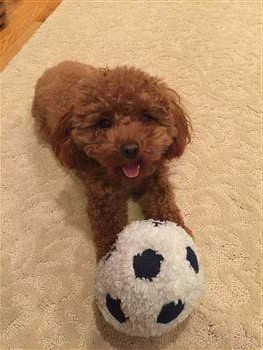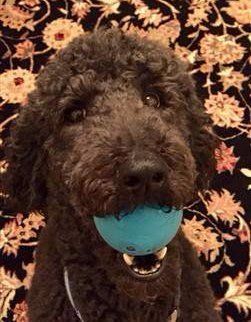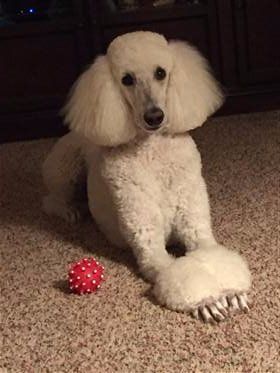Poodle Intelligence
Overview
When the element of canine intelligence comes up, many people will refer to the Poodle breed, as he is known for being one of the smartest breeds in the world.
But how was this decided upon and is there proof to back this up?
In addition, how does the intelligence of Poodles compare to humans? With this breed having such a strong reputation for being so smart, what does it mean if a Poodle does not seem to be as clever as he should be?
Is this something that can develop? Are there things that owners can do to allow their Poodle to live to his or her potential?
These are all very interesting questions that this section will be answering today. After all, with the Poodle having so much attention on how smart he is ‘supposed’ to be, owners no doubt are curious exactly what this means and how it relates to their own particular dog.
Poodle Intelligence Ranking
We wonder if Dr. Stanley Coren a professor of canine psychology at the University of British Columbia in Vancouver knew what a stir he would cause. In 1994, he decided to publish a book that would rank 133 dog breeds in order of intelligence. However, there is some controversy regarding just how accurate this ranking is.

Ruby, at 1 and 1/2 years old
Photo courtesy of Barry Litwin - Chappaqua, NY
There are a few points to note:
1. He, himself, did not study or observe any of the dogs.
2. He sent questionnaires to AKC and CKC (Canadian Kennel Club) show judges. They were asked to give their opinion based on what they saw in show. 199 people answered him (about 50%).
3. The ranking of intelligence left out many facets of it; this was to judge dogs solely on working and obedience intelligence. This leaves out instinctive (level of canine instinct), adaptive (problem solving) and emotional (how emotionally evolved a dog is) intelligence.
4. Some dog breeds were left out of this ranking; any that did not receive at least 100 responses were not included.
When the book came out, there were many that agreed on his methods and many who did not. In 2006, he published another book which included survey responses from dog owners which showed a general consensus in regard to the element of trainability.
Where did the Poodle rank?
The Poodle breed places in the #2 spot. Many wonder if this refers to a specific variety of Poodle. For this particular intelligence survey, all Poodles – Toy, Miniature and Standard varieties, were judged as one.
There were 10 breeds placed in the ‘most intelligent’ category, called the ‘Brightest Dogs’. The Border Collie came in above the Poodle at #1 and the German Shepherd came in below the Poodle at #3. Essentially, the dogs in this top ranking were able to understand a new command with fewer than 5 repetitions and obeyed a command the first time it was said 95% of the time.
This throws off many Poodle owners who are proud that the Poodle breed ranks so highly in intelligence, but wonders what in the world may be wrong, since their own Poodle does not come close to being that clever. And we’ll discuss this more ahead.
Should all Poodles Be Exceedingly Smart? Because my Poodle Has a Way to Go!
We hear questions like this a lot. There are 3 things to keep in mind:
#1. The Poodles that were judged when being ranked for intelligence were show dogs. They were Poodles that had experience in the ring, with perfected heeling techniques and were fully trained in regard to commands.
#2. The Poodle is indeed very smart and has the capacity to learn; but puppies
and dogs still need proper training in order to then carry out those commands. In many cases, it is a matter of knowing the best way to train your Poodle.
#3. There are many different ways to rank intelligence, with commands being just part of this equation. It’s important to offer your Poodle a life that allows him to live to his full capacity, not just with being able to follow a command, but in all aspects of understanding his world and interacting with it.
We will dive into #3 ahead, but first let’s go over some ways that may help you train your Poodle and allow him to follow commands to hold up that ranking of ‘high intelligence’ that he is known for:
• Work on 1 command at a time. Generally, ‘Sit’ in the first one that should be taught.
• Make sure that both you and your Poodle are in the mood. If a dog is expecting something else (a meal, a walk, etc.), is tired or has too many distractions, he won’t be in a mood to learn. If an owner feels rushed or stressed, he/she won’t be in the mood to teach.
• Obtain solid training guidelines (recommendations below), since being a trainer is much easier when you have step-by-step instructions for all aspects.

Here's one very clever dog!
Persie(short for Persephone), at 9 weeks old (Standard parti)
Photo courtesy of Ron Binfield - Prince Edward Island, Canada
Other Types of Intelligence
Language- Being able to understand what is spoken is a huge element to intelligence. While a dog will need to understand a command word to obey it (and that was the whole basis for the ranking of canine intelligence), it goes far beyond this.
A dog, in general, will understand 165 words.
These will be ‘cue’ words such as ‘meal time’ and ‘walk’, however it also includes names of both people and places and even such things as ‘snow’, ‘sun’ and more. If an owner takes the time to teach their dog words, a Poodle can easily learn up to 300.
Perhaps you have heard of Chaser, a border collie, a dog that knew over 1000 words? While your Poodle may never reach that degree of understanding, just about every dog can learn more, if given the chance.
Memory skills
– Long ago, it was believed that a dog had very short term memory, however this of course is not true. Canines have both short and long term memory. In regard to short term, it is true that a dog may forget a certain action after as little as 5 minutes (and this is why reprimanding a Poodle for a housebreaking accident does not work if some time has passed), however when a dog receives repetition, something then moves from short term to long term memory, where it can essentially be stored forever.
This is proven by dogs that have been lost for months or even years, that find their way back home, remembering both the location and their owners.
If there is something that you want your Poodle to learn, teaching it to him several times per day, each day, is the quickest route to him gaining an understanding of it.
Perception
– This intelligence aspect involves how one uses all of their senses to well, make sense of the world! Canines are far better than humans in regard to hearing and scent. Even in regard to vision, dogs see much better in the dark than us humans. It is estimated that canines see in light five times dimmer than a human can see in.
So, just looking at this element, your Poodle is aware of things that you are not, making him (in a way) smarter in regard to situational awareness.
Another quite amazing aspect to this, is a dog’s ability to perceive the magnetic poles of the Earth.
A study was done to test this and it showed that if a dog is left to do as he wished (no fences to get in the way, not on leash, no distractions, etc.) that he will align his/her body north to south when urinating or eliminating.
Though the Poodle breed was not among the dogs studied, 37 different breeds were involved and studied over a period of 2 years.
How Smart is a Poodle Compared to a Human?

Rickey, at 6 years old
Photo courtesy of Allen Honig
Since the Poodle is ranked as one of the smartest dog breeds in the world, it’s quite common for people to wonder how they compare to humans. If you feel that having your Poodle is equivalent to having a child, you are not far off in your thinking. Canines, in general, are as smart as a 2 to 3-year-old human.
While there are no specifics studies done to prove to disprove the question if Poodles are closer in intelligence to humans than other breeds, one must remember that only working & obedience were factored into his #2 intelligence ranking.
Still, being at the level of a 2.5 child (on average) is saying quite a bit. Toddlers have an amazing skill set including problem solving, enthusiasm to fulfill curiosity, enjoyment of senses and motor skills and logical reasoning.
You may wonder what it is that holds dogs back from gaining enough intelligence and learning to be as smart as a 4 or even 5-year-old. When making the ‘2 to 3 year old’ analogy, 2 main elements were taken into account: The number of emotions a dog is able to have and, importantly, the often contested aspect of self-recognition.
We will discuss emotions in a bit, however in regard to self-recognition, this refers to a human’s ability to look in a mirror and know that he is looking at himself. This capability develops as young as the 18 month mark in humans, but never later than the 3 year mark. This is one of the main reasons why Poodles (or any other breed), is said to not be able to be smarter than a 3 year old; they do not recognize themselves in mirrors.
But, not everyone agrees. One outspoken proponent for canine intelligence is former Professor of Ecology and Evolutionary Biology, Marc Bekoff. He contends that dogs are not visual creatures and if they were asked to identify themselves based on scent -and not sight – that they would do this quite easily.
Emotional Intelligence
How many emotions one can feel plays a huge role in defining their level of intelligence. You may be surprised to know that humans are not born able to feel or express all of the possible emotions that one may have. It is over the first few years that they develop. It is hard to believe, but
babies are born with only one: excitement.
Many wonder then, how can it be that they smile? Does that show happiness?
Well, doctors and researchers say that it begins as an involuntary neurological activity and then at about the 3 month mark, a baby will begin to smile as a social engagement. The ability to express true happiness (contentment) develops soon afterward.
As they mature, the ability to feel and express more emotions develop and they do so in a particular order: Excitement, distress, contentment, disgust, fear, anger, joy, suspicion, shyness, affection and love. By the one-year mark in humans all of these are present. And, it is at this point that there is said to be a separation between humans and dogs.
It is believed by many (most notably Dr. Stanley Coren, author of the Intelligence of Dogs) that dogs do not then continue on to develop shame, pride, guilt and contempt.
Of course, many owners debate this. Just look at the AKC Poodle breed standard, it states (in part), ‘moving soundly and carrying himself proudly’. And if you asked owners if their Poodle ever showed shame after chewing apart something in the house or after having an accident, it would be a resounding “Yes!”.
The Takeaway
While there will always be some debate regarding the ranking of dog breeds and what types of capabilities should be used to judge brainpower, it is clear that canines are indeed intelligent creatures.
Dogs are capable of understanding words, feeling and expression emotions, able to problems solve, reason, socialize and so much more.
Ways to Help Your Poodle Be Smarter and Live to His Potential
Dogs that are isolated never learn to be social. Dogs that are not spoken to never learn words. And dogs that are not taught commands, never learn to obey them.

Bojangles, at 5 months old, enjoying sightseeing,
Photo courtesy of Mike & Marge
Your Poodle has the capacity to learn a great many things, but will never reach his or her full intelligence capability unless they are given the opportunity.
And since dogs learn by repetition, if you do want to help your Poodle increase his brainpower, it must be done with consistency on a regular basis.
Here are some great starting points:
Engagement of the senses: As we touched on earlier, canines have more developed hearing and scent abilities than we do and they love to use them. Allowing your Poodle to work on these not only helps keep his skills honed, but can also increase his level of contentment.
When a dog is taken outside to smell new scents, see new things and hear new sounds, he generally goes home a happy dog; regular exercise helps calm a hyper dog
and typically lends to better behavior.
Finally, regular outings are a fantastic method to socialize a Poodle to new events and settings.
Word comprehension:
Your Poodle has the intellect capacity to learn, at a minimum, 200 words and when an owner makes a concerted effort, 300 or 400 is quite doable. The more words your Poodle learns, the better the communication will be with you and your dog.
And of course, dogs do not need to verbalize back in order for this to be a two-way street. A dog may take a specific action (mouth his leash, fetch the remote, hold a door open, clean up his toys, etc.) or he may gain contentment in understanding (wait patiently as you finish a task before playing, relax after being told that a certain noise is not cause for alarm, etc.)
When teaching the words of certain objects, choose 3. Place them out in a line.
Pick up each, saying the name with clear articulation. Repeat several times and then encourage your Poodle to nose, paw or mouth the one that you are asking for.

Diamanté Bianca, at 3 years old
Photo courtesy of Vince DiPietro
Give praise when he is correct and offer patience when he is still learning.
When training for commands, be sure to have a trusted guideline, so that the lessons are fun and effective while reaching your goals as quickly as possible.
Problem Solving
– One of the best ways to allow a Poodle to really engage his mind is to offer him a puzzle to figure out. You can make a homemade puzzle by hiding small treats under turned-over cups and encouraging your Poodle to find which one holds the treasure.
However, if you really want to get those gears spinning, try an owner-and-pet ‘together’ game. These are canine games in which the owner is meant to play alongside their dog, showing them how to perform actions such as nosing a lever or pawing a button, with the goal being to release or show a treat.
There are varying levels, so that as your Poodle becomes smarter, you can keep the game challenging.
And these are a great bonding method as well, as you will work as a team.
A Final Word
Being ranked as one of the most intelligent dog breeds is a lot for a Poodle to live up to.
And this might put pressure on an owner who expects their Poodle to naturally be the cleverest dog on the block.
However, every Poodle will be unique in regard to intellect. One Poodle may have commands down pat, but struggle to socialize with others. Another Poodle may be brilliant at expressing emotions, but have a hard time learning to heel.
One thing, however, is clear: A dog can only be as smart as his number of learning opportunities allow.
You may also like:
My Poodle has an upset stomach
- This can really take a toll on a dog. Read what can cause this, immediate steps to take at home and red-flag warning signs that a vet visit will be needed.
My Poodle smells funny
- Whether it's coming from the mouth, ears, genital area or all over the body, learn the top reasons why a Poodle may start to have a stinky odor and exact steps to not only remove the bad smell, but to keep your Poodle fresh and clean in between baths.
Apricot Poodles
- This breed can be found in an array of beautiful colors, though apricot is one of the prettiest and most popular.
